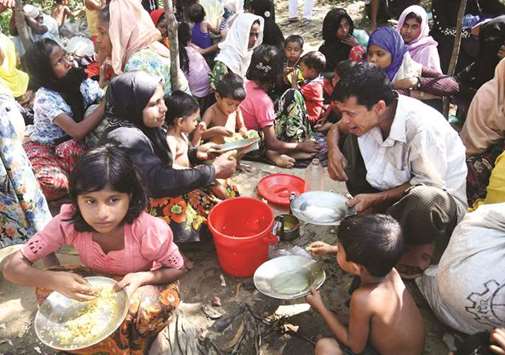Bangladesh has assigned a total of 106 medical teams led by Cox’s Bazar civil surgeon and is providing medical services to around 450,000 Rohingya sheltering in the country’s southeastern region bordering Myanmar.
“We have 32 medical teams under our Health Ministry and 74 more joint teams with our donor agencies to provide primary healthcare services among the Rohingya refugees,” Health and Family Welfare Minister Mohammad Nasim told newsmen yesterday.
He said in line with the directives of Prime Minister Sheikh Hasina, the health ministry is providing the maximum possible medical services to the refugees “within our limited resources considering it a humanitarian issue”.
Besides, cholera immunisation campaign was introduced to protect newly arrived Rohingya and the local communities from life-threatening diseases where 650,000 children were administered with vaccines.
Massive motivational campaign was also launched to keep their family size smaller alongside providing them with kits containing birth control pills and other contraceptives also to prevent outbreak of sexually transmitted diseases (STD).
“We have already mobilised several medical teams to create awareness among Rohingya about sexually transmitted diseases and birth control methods and provided them with contraceptives kits,” Nasim said.
Apart from this, the Bangladesh government’s disease monitoring wing Institute of Epidemiology, Disease Control and Research (IEDCR) distributed measles and polio vaccines and vitamin tablets among them, he added.
Rohingya after fleeing Myanmar, generally suffer from diarrhoea, acute respiratory throat infection, pneumonia, chronic skin disease psoriasis and fever due to intake of contaminated food and water, Cox’s Bazar district civil surgeon Dr Abdul Salam said.
Special arrangements have also been taken for pregnant women and the people, who have high blood pressures, diabetes and other long-term diseases, he said.
According to the International Organisation for Migration, over 820,000 Rohingya have fled Myanmar to southeastern Bangladesh till November 4.

Rohingya Muslim refugees who entered Bangladesh by boat rest as they wait to go to refugee camps near the Thankhali refugee camp in Bangladesh’s Ukhia district yesterday.
